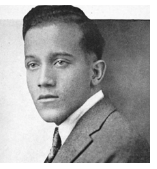Sonnet
I would not tarry if I could be gone
Adown the path where calls my eager mind.
That fate which knows naught but to grip and bind
Holds me within its grasp, a helpless pawn,
And checks my steps when I would travel on.
Forever shall my body lag behind,
And in this valley with the moaning wind
Must I abide with never a glimpse of dawn?
Though bends my body towards the yawning sod,
I can endure the pain, the sorrows rife,
That hold me fast beneath their chastening rod,
If from this turmoil and this endless strife,
Comes there a light to lead man nearer God,
And guide his footsteps toward the Larger Life.
This poem is in the public domain. Published in Poem-a-Day on February 25, 2024, by the Academy of American Poets.
“Sonnet” appears in Joseph Seamon Cotter Jr.’s poetry collection The Band of Gideon, published in 1918. Seamon Cotter Jr. is noted as one of the early African American sonneteers, and in “Sonnet vs. Sonnet: The Fourteen Lines in African American Poetry,” professor of literature Antonella Francini analyzes the employed use of the sonnet and affirms, “[W]hen the African American sonnet began to acquire distinctive characteristics in the hands of some of the Harlem Renaissance poets, it was conceived as ‘an invitation to converse,’ a space from which a single voice launched an appeal to an implied audience in the attempt to elicit a reply or a reaction. Much like its medieval archetype, it appears to be a vehicle of communication rather than a mere display of a poet’s technical skills or a conventional replica of European aesthetic manners, as were the majority of sonnets produced in the nineteenth century in America.”

